|
|
| Sei in: Cinema e Medioevo ® Indice alfabetico dei film |
Una volpe a Corte
(Le roman de Renard)
1930, regia di Irène Starevitch, Ladislas Starevitch
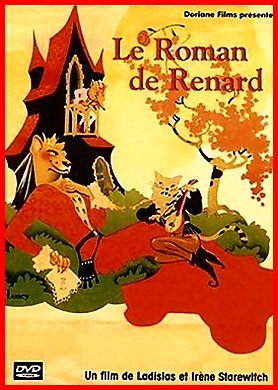
Scheda: Nazione: Francia - Produzione: Starewitch Film, Louis Nalpas (versione muta), Roger Richebé (version sonora francese) - Distribuzione: Colosseum, Ars Film, A.V. Film, Equitable Film, Les Acacias Cinéaudience, Universum Film, Cineaudience, Volksbildungshaus Wiener Urania - Soggetto: dal libro La volpe Reineke di Johann Wolfgang Goethe (e dai testi poetici medievali francesi noti come Le roman de Renard) - Sceneggiatura: Irène Starevitch, Ladislas Starevitch - Dialoghi: Jean Nohain, Antoinette Nordmann - Adattamento: Roger Richebé - Fotografia: Ladislas Starevitch - Montaggio: Laura Séjourné - Direzione artistica: Ladislas Starevitch - Musiche: Vincent Scotto - Animazione: Irène Starevitch, Ladislas Starevitch - Formato: B.N., animazione (con marionette) - Durata: 73' (62').
Voci: Claude Dauphin, Romain Bouquet, Laine, Sylvain Itkine, Léon Larive, Robert Seller, Eddy Debray, Nicolas Amato, Pons, Sylvia Bataille, Suzy Dornac, Jaime Plama.
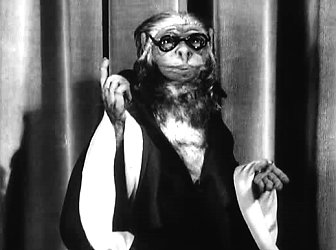
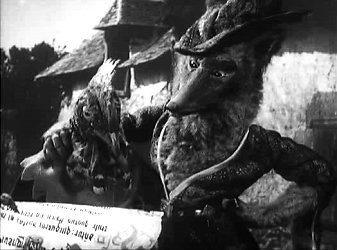
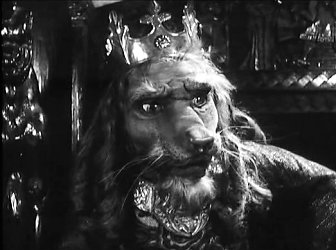
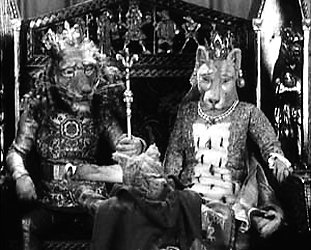
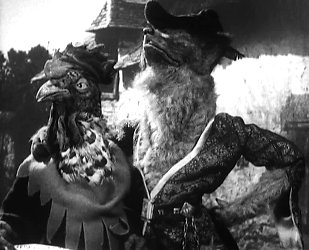
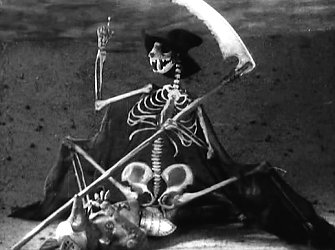
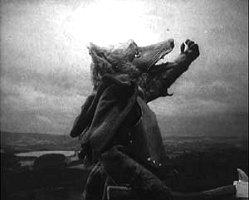
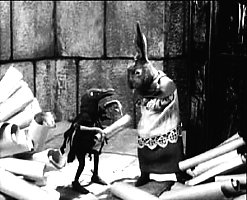
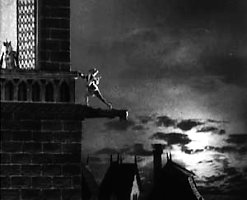
![]() Trama e commenti:
cinematografo.it
-
mymovies.it
- it.wikipedia.org
- mag.sky.it
- foglidarte.com
- asianworld.it:
«...lungometraggio dell'animatore polacco/russo emigrato in Francia,
realizzato insieme alla figlia Irène a partire dal libro La volpe Reineke
di Goethe. Il film fu proiettato in Germania nel 1937 e in Francia nel 1941, ma
la sua realizzazione risale a molto tempo prima. Già nel 1926 si comincia a
lavorare sulla sceneggiatura e le riprese dureranno circa 18 mesi. Era
praticamente finito nel 1930 ma ci volle ancora molto tempo per registrare le
musiche e i dialoghi. Il romanzo di Goethe è ispirato a storie medievali e
racconta le malefatte di una volpe di nome Reynard che crea scompiglio nel
villaggio e, grazie alle sue astuzie, la fa sempre franca. L'animazione è
semplicemente sorprendente e non manca un coinvolgente senso dell'affabulazione».
Trama e commenti:
cinematografo.it
-
mymovies.it
- it.wikipedia.org
- mag.sky.it
- foglidarte.com
- asianworld.it:
«...lungometraggio dell'animatore polacco/russo emigrato in Francia,
realizzato insieme alla figlia Irène a partire dal libro La volpe Reineke
di Goethe. Il film fu proiettato in Germania nel 1937 e in Francia nel 1941, ma
la sua realizzazione risale a molto tempo prima. Già nel 1926 si comincia a
lavorare sulla sceneggiatura e le riprese dureranno circa 18 mesi. Era
praticamente finito nel 1930 ma ci volle ancora molto tempo per registrare le
musiche e i dialoghi. Il romanzo di Goethe è ispirato a storie medievali e
racconta le malefatte di una volpe di nome Reynard che crea scompiglio nel
villaggio e, grazie alle sue astuzie, la fa sempre franca. L'animazione è
semplicemente sorprendente e non manca un coinvolgente senso dell'affabulazione».
![]() Plot Summary, Synopsis, Review: IMDb
-
allmovie.com
-
movies.msn.com
-
nytimes.com
-
citadelle.org
-
fr.wikipedia.org
-
afca.asso.fr
-
dvdanime.net
-
furry.wikia.com
-
dvdclassik.com
-
objectif-cinema.com
-
dorianefilms.com
-
movierapture.com:
«Renard the Fox outwits various other beasts through cunning and trickery.
His victims, angered by such treatment, complain to the lion, the king of the
animals, who agrees to bring the miscreant to justice. Renard, however,
frustrates all the king's agents, and the king himself, prompting the lion to
send an army to the fox's castle to punish him for his crimes. Analysis. Not
only is Ladislaw Starewicz's Le Roman de Renard a marvelous picaresque
adventure, it is also one of the true classics of cinema. The film is performed
exclusively by puppets of animals moved by means of stunning, technically
brilliant stop motion animation, and the effect the director achieves by
populating his work solely with such puppets is truly bewitching. In fact,
Starewicz's animated creations lend the movie a palpable magic which complements
his already delightful narrative. Even if either the film's story or the images
through which it is told were a failure, the other alone would make Le Roman
de Renard an enthralling work. Fortunately, the director has filled his movie
with such wonderful characters that their tales are invariably and joyously
captivating. Starewicz has, for example, retained Renard's charmingly dishonest,
amoral character. The fox is a disreputable, sly, and self serving rogue, but he
is also remarkably entertaining. Renard's story is, consequently, a delight to
watch. He tricks his various opponents, causes them discomfort and
embarrassment, and even outwits the combined efforts of all the beasts of the
lion's kingdom. Rather than learning from his sins, as would the hero of most
films, which are generally sadly bowdlerized and unnecessarily didactic, Renard
ultimately benefits. He is richly rewarded for his vices. Such elements make the
movie's consistently well realized story endlessly fascinating. The viewer is...»
(Keith Allen).
Plot Summary, Synopsis, Review: IMDb
-
allmovie.com
-
movies.msn.com
-
nytimes.com
-
citadelle.org
-
fr.wikipedia.org
-
afca.asso.fr
-
dvdanime.net
-
furry.wikia.com
-
dvdclassik.com
-
objectif-cinema.com
-
dorianefilms.com
-
movierapture.com:
«Renard the Fox outwits various other beasts through cunning and trickery.
His victims, angered by such treatment, complain to the lion, the king of the
animals, who agrees to bring the miscreant to justice. Renard, however,
frustrates all the king's agents, and the king himself, prompting the lion to
send an army to the fox's castle to punish him for his crimes. Analysis. Not
only is Ladislaw Starewicz's Le Roman de Renard a marvelous picaresque
adventure, it is also one of the true classics of cinema. The film is performed
exclusively by puppets of animals moved by means of stunning, technically
brilliant stop motion animation, and the effect the director achieves by
populating his work solely with such puppets is truly bewitching. In fact,
Starewicz's animated creations lend the movie a palpable magic which complements
his already delightful narrative. Even if either the film's story or the images
through which it is told were a failure, the other alone would make Le Roman
de Renard an enthralling work. Fortunately, the director has filled his movie
with such wonderful characters that their tales are invariably and joyously
captivating. Starewicz has, for example, retained Renard's charmingly dishonest,
amoral character. The fox is a disreputable, sly, and self serving rogue, but he
is also remarkably entertaining. Renard's story is, consequently, a delight to
watch. He tricks his various opponents, causes them discomfort and
embarrassment, and even outwits the combined efforts of all the beasts of the
lion's kingdom. Rather than learning from his sins, as would the hero of most
films, which are generally sadly bowdlerized and unnecessarily didactic, Renard
ultimately benefits. He is richly rewarded for his vices. Such elements make the
movie's consistently well realized story endlessly fascinating. The viewer is...»
(Keith Allen).
![]() Approfondimenti: Movie
Review
Approfondimenti: Movie
Review
Conosciuto anche con i titoli: The Story of the Fox; The Tale of the Fox; Reineke Fuchs Die Komödie der Tiere.